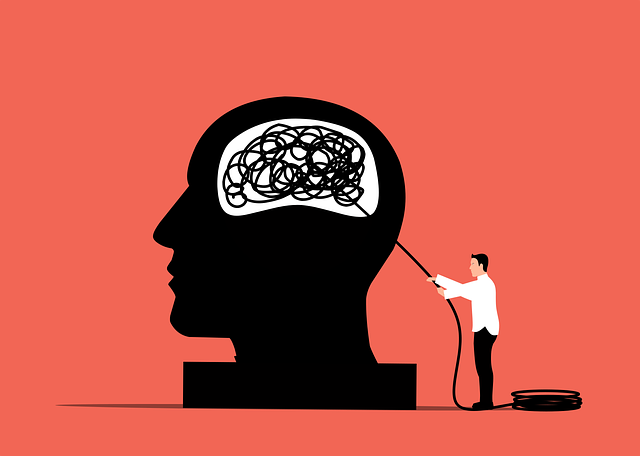Anxiety disorders, characterized by excessive fear and worry, impact daily life. Understanding symptoms and various types, such as Generalized Anxiety Disorder (GAD), Panic Disorder, and Social Anxiety Disorder, is key to effective anxiety treatment. Cognitive Behavioral Therapy (CBT) targets negative thoughts, while Exposure Therapy helps confront fears in a safe environment. Mindfulness-based approaches like MBCT and yoga manage anxious thoughts through present-moment awareness. Medication, such as SSRIs and SNRIs, can be prescribed alongside therapy to target specific neurotransmitters. Sustainable lifestyle changes, including exercise, balanced diet, and sleep routines, along with social support, are crucial for long-term anxiety management.
Anxiety disorders affect millions, yet understanding their complexities is key to effective therapy. This comprehensive guide explores various therapeutic approaches for managing anxiety, from Cognitive Behavioral Therapy (CBT) and Exposure Therapy to Mindfulness-Based practices. We delve into medication options and emphasize the importance of lifestyle changes for long-term anxiety relief. Discover practical steps, expert insights, and strategies to empower your journey towards overcoming anxiety disorders and reclaiming control over your life.
Understanding Anxiety Disorders: Symptoms and Types

Anxiety disorders are a group of mental health conditions characterized by excessive and persistent fear, anxiety, or worry that interfere with daily living. Understanding what constitutes an anxiety disorder is crucial for seeking effective anxiety treatment. Symptoms can include restlessness, fatigability, difficulty concentrating, irritability, muscle tension, and sleep disturbances.
There are several types of anxiety disorders, including generalized anxiety disorder (GAD), panic disorder, social anxiety disorder, specific phobias, and obsessive-compulsive disorder (OCD). Each type has unique features. For instance, GAD is marked by widespread, often uncontrollable worry about various aspects of life, while panic disorder involves recurrent and unexpected panic attacks, which are intense periods of fear accompanied by physical symptoms. Recognizing the specific type of anxiety disorder helps in tailoring appropriate anxiety treatment strategies.
Common Therapies for Effective Anxiety Treatment

Common Therapies for Effective Anxiety Treatment
Cognitive Behavioral Therapy (CBT) is one of the most widely recognized and effective therapies for anxiety disorders. CBT focuses on identifying and changing negative thought patterns and behaviors that contribute to anxiety, helping individuals develop healthier coping strategies. Through structured sessions, patients learn to challenge and replace distorted beliefs with more realistic and positive ones, thereby reducing anxious symptoms.
Other evidence-based therapies include Exposure Therapy, which gradually exposes individuals to feared situations or objects in a safe environment to help them overcome their anxieties, and Mindfulness-Based Therapies, which teach present-moment awareness and non-judgmental acceptance of thoughts and feelings. These approaches promote relaxation, reduce rumination, and foster a sense of calm, making them valuable tools in the arsenal for anxiety treatment.
Cognitive Behavioral Therapy (CBT): A Step-by-Step Guide

Cognitive Behavioral Therapy (CBT) is a highly effective anxiety treatment approach that focuses on identifying and changing negative thought patterns and behaviors. It involves a structured process where therapists guide individuals through several steps to manage anxiety effectively.
The first step in CBT is understanding and recognizing the triggers and symptoms of anxiety. This includes keeping a journal to track anxious thoughts, feelings, and physical sensations. Once identified, these triggers are addressed through various techniques. For example, challenging negative thoughts by providing evidence against them and reframing them into more realistic perspectives. Additionally, gradual exposure to feared situations helps individuals face their anxieties in a safe environment, gradually reducing their response over time.
Exposure Therapy: Confronting Fears to Overcome Anxiety

Exposure therapy is a powerful technique within the realm of anxiety treatment, designed to help individuals confront and overcome their fears in a safe and controlled manner. By gradually exposing themselves to anxiety-provoking situations or objects, patients learn to manage their response and realize that their feared outcomes rarely materialize. This process empowers them to challenge negative beliefs and replace them with more realistic, positive thoughts.
During exposure therapy sessions, a therapist guides the patient through a series of steps, starting from less intimidating scenarios and gradually progressing to more challenging ones. Through repetition and practice, individuals develop coping strategies and build resilience, allowing them to face their fears head-on. This evidence-based approach has proven highly effective in treating various anxiety disorders, offering long-lasting results and improved overall well-being.
Mindfulness-Based Approaches to Manage Anxiety

Mindfulness-based approaches have emerged as powerful tools in the arsenal against anxiety disorders. These techniques encourage individuals to focus on the present moment, accepting their feelings and sensations without judgment. By cultivating awareness of thoughts and bodily responses, mindfulness practices can help manage anxious thoughts and reduce avoidance behaviors. Research has shown that mindfulness meditation, a key component of these approaches, significantly improves symptoms of anxiety, depression, and stress.
One popular method is Mindfulness-Based Cognitive Therapy (MBCT), which combines cognitive therapy with mindfulness exercises. This approach helps individuals recognize patterns of negative thinking and provides strategies to respond to anxious thoughts differently. Other techniques, such as yoga and deep breathing exercises, also integrate mindfulness, promoting relaxation and calming the mind. These practices offer a gentle yet effective way to manage anxiety symptoms, enabling individuals to develop a stronger sense of emotional balance and overall well-being.
Medication Options for Anxiety Disorders

Anxiety disorders are treatable, and one of the common approaches alongside therapy is medication. Pharmaceutical interventions aim to manage symptoms by targeting specific neurotransmitters in the brain that regulate mood and emotions. Selective Serotonin Reuptake Inhibitors (SSRIs) and Serotonin-Norepinephrine Reuptake Inhibitors (SNRIs) are commonly prescribed for anxiety disorders, as they increase the levels of serotonin and norepinephrine, which can help reduce symptoms of fear, worry, and restlessness. These medications can take several weeks to show their full effect, and it’s crucial to maintain regular communication with a healthcare provider during the process to ensure optimal dosing and minimal side effects.
Medications for anxiety disorders are not one-size-fits-all; different drugs may work better for specific conditions or individuals. Some people might experience improvements in their symptoms, while others may need to try several options before finding the most effective treatment. It’s essential to weigh the potential benefits against any side effects and discuss any concerns with a healthcare professional to make an informed decision regarding anxiety treatment.
Lifestyle Changes and Support for Long-Term Anxiety Management

Making sustainable lifestyle changes is a crucial aspect of long-term anxiety management. This includes adopting healthy habits such as regular exercise, balanced nutrition, and adequate sleep routines. Research has shown that physical activity can reduce anxiety symptoms by boosting mood and promoting relaxation through neurochemical changes in the brain. A diet rich in whole foods and omega-3 fatty acids can also support mental health by stabilizing blood sugar levels and reducing inflammation, which are known contributors to anxiety.
Additionally, building a strong support system is vital for managing anxiety disorders effectively. Social connections provide a sense of belonging and safety, helping individuals cope with stressful situations. Sharing experiences and feelings with trusted friends, family, or support groups can lessen the burden of anxiety and foster resilience. Online communities and therapy groups are also excellent resources for those seeking like-minded individuals who understand their struggles, thereby enhancing feelings of acceptance and understanding.
